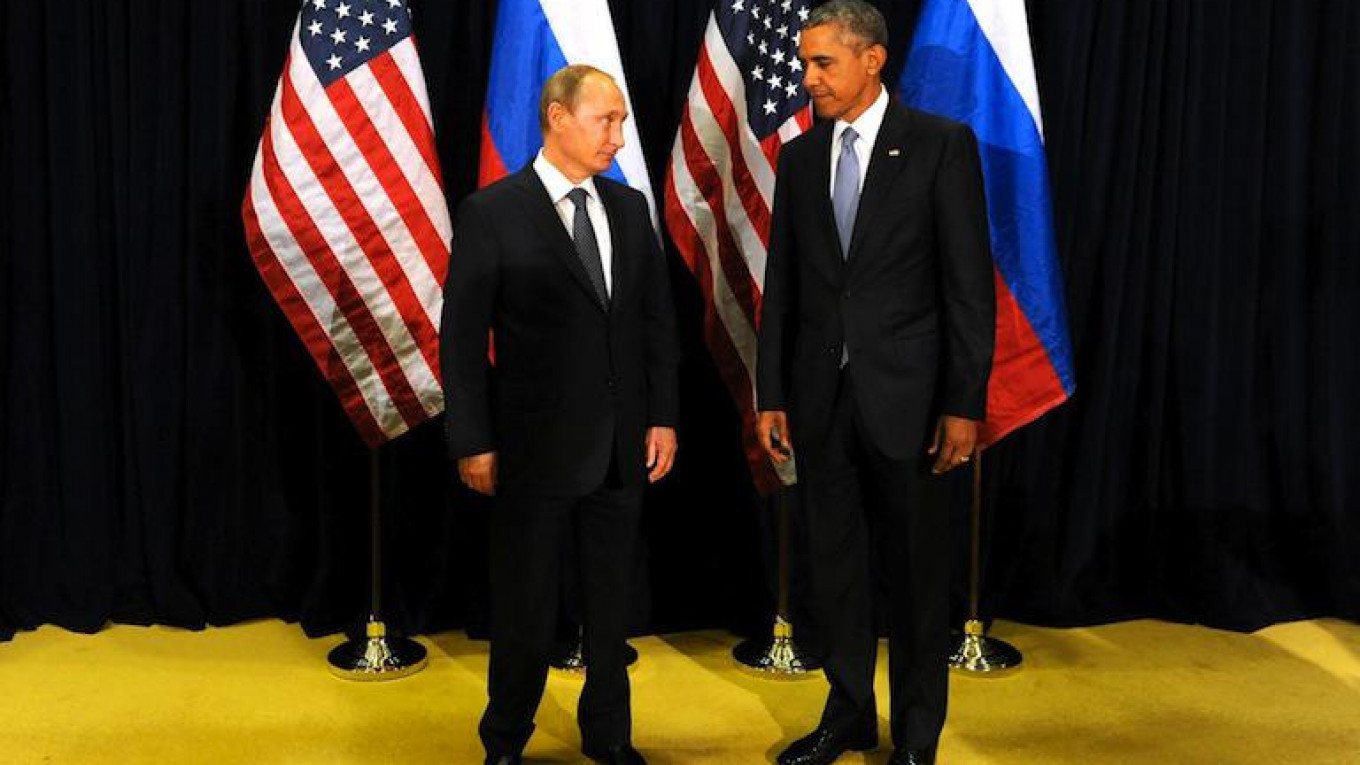The West has increasingly spoken in recent years of the need to contain Russia. But in doing so, it has blurred the line between “containment” and “deterrence.” Today, observers speak primarily of the latter, with the connotation of “intimidation” and the use of “scare tactics.” Of course, containment is impossible without the use of force, but where simple scare tactics suffice, full-scale containment is unnecessary.
At a recent meeting between Russian experts and U.S. investors and political analysts, the discussion focused on the need to make corrections to the so-called “plutonium agreement.” The U.S. delegation reiterated that the conflict over weapons-grade plutonium is a simple misunderstanding on technical matters.
However, the Kremlin does not want the problem to be perceived this way. Otherwise, it would not have incorporated an ultimatum to the United States in the text of a federal law subsequently adopted by the State Duma. That law calls for the U.S. to reduce its military infrastructure on the territory of NATO member states, “abandon its hostile policy towards Russia,” and even “provide compensation for damages Russia suffered…from having to introduce counter-sanctions against the U.S.” Normally, victorious countries deliver such ultimatums to the vanquished.
The law communicates one message very clearly – that when it comes to the most important issues, nothing and no-one can “contain” Moscow.
Critics of U.S. President Barack Obama argue that his policy of sanctions has failed. They point out that, even under sanctions, Russia has managed to work against U.S. interests in a number of regions around the world.
However, the classical 1940s concept of containment did not imply the literal isolation of the Soviet Union, much less the entire Eastern bloc. Even during his most fervently anti-Kremlin period, George F. Kennan, the founder of U.S. containment strategy during the Cold War, held that the only way to contain Russia was not to isolate it, but to involve it in the global system. Kennan advocated using a system of checks and balances that differed fundamentally from the one that guarantees domestic freedoms in the Anglo-Saxon world.
Here we come to the core of the problem.
Why did the U.S. concern itself with this issue in the first place? Because, when a center accustomed to applying force to others loses its bearings, it has the potential to go unstable. It becomes incapable of assessing the risks of its behavior. So what should be done?
In the 1940s, the West aimed its strategy, oddly enough, at helping Stalin’s Russia move forward in a predictable manner, without excesses. It compensated for the Soviet Union's ruinous lack of internal restraints with a system of external political constraints. The West did not seek to isolate the Soviet Union, but left it room to move, instead attempting to channel that energy along a particular path. This gave rise to the concept and policy of “containment.”
The intentional sphere had a two-bloc system, and although observers continued referring to it as a Cold War, it was essentially a process of searching for equilibrium. The extreme shortage of democracy in the Eastern Bloc was offset by external substitutes, ranging from NATO and the UN, to the IMF and EU.
It is no accident that Russia is losing its restraint. It stems from weakness, from long having sought an easy way to integrate with the global system rather than doing the hard work of institution building and reform.
Now the Moscow authorities always have something to offer the Russian people: the ability to ratchet up tensions in the world and grab the spotlight.
Russia is very weak. It has no state institutions and no competent government bureaucracy. Its leadership has degenerated into a personality cult. And what’s more, that leadership is always ready to aggravate the situation. Only in this way do its members take on the appearance of true leaders – only during those brief moments when tensions flare over yet another emergency that they themselves have created.
Putin, in the role of President, has already played the lead in so many different scenes that any actor might envy him. But this musical comedy has gone on too long – and for Putin himself, it has become a daily charade. It has been said that some tzars reign, but they don’t govern. In Russia, every attempt at governing immediately degenerates into a sham.
Can any such structure hold itself together from within? No. Can an outside force keep it in line? No it can't.
Russia has turned itself into a generator of global crises, and has been offering it for some time now practically as a product or service. Now the Moscow authorities always have something to offer the Russian people: the ability to ratchet up tensions in the world and grab the spotlight.
It would be a mistake to look at the Admiral Kuznetsov warship, belching smoke as it plies the English Channel, and see it as a simple yet controversial symbol of Russian weakness. Deep inside, unsuspected by the casual observer, lies an engine room – a crisis generator. The grime and smoke, typical of any engine room, are signs that it is working – cranking out one risk-laden emergency after another. The generator compensates for its relative weakness with the fact of its indestructibility and its readiness to stir up trouble whenever and wherever needed.
In conversations with Americans, I am surprised at how they regret their inability to keep Russia out of the New World Order. But that Order is essentially one of global containment. That system includes everyone while restraining each in a way that serves the interests of all. It is impossible to build relations with Russia that are separate from the world order.
The greatest danger to the modern world is if a sovereign state possessing a huge arsenal of weapons of mass construction were to become uncontrollable. The only three countries capable of posing such a hypothetical threat are the United States, China, and Russia – each of which has very different nuclear capabilities. Only those three states are capable of deliberately upsetting the global status quo with a single, heavy-handed act of abandon. Of course, that could only happen under yet unimagined circumstances – but such circumstances have never been conceivable beforehand. It is therefore the goal of the future world order to contain all three of those states. Without that ability, the very idea of a world order loses any meaning.
Containment is like the strong exoskeleton of control that compensates for the lack of internal political integrity. But if to consider the benefits of containment as it applies to Russia, why limit that discussion to Russia?
The eight-year run of Obama’s peace-loving administration follows the less successful imperial escapades of former U.S. President George W. Bush. The fear of a Donald Trump presidency that has gripped the U.S. establishment – not unlike what happened in Russia in 1996 – has caused a mobilization of the masses intent on doing whatever it takes to keep out evil.
The world is just as interested in the soft containment of the U.S. as it is in supporting its positive contribution – if not outright leadership – in various sectors. In any future world order, Russia will, by default – with or without Putin – remain a restraining factor against the U.S. on a par with the European Union and China. Even the conservative structures of NATO and the United Nations to some extent serve as constraints against U.S. hubris.
Russia’s military intervention in the Syrian conflict prompted the formation of a “lesser UN” of sorts in the Middle East that includes Turkey, Saudi Arabia, the United States, Russia, Iran, China, and the EU.
The series of ongoing crises has effectively become the new world order. The situation in Aleppo is nothing but bloody chaos for its residents, but for the major powers, it is the venue of their interaction and the architecture of their mutual deterrence.
Russia has lost its previous frame of reference. It needs a new one for the sake of future progress. Russia needs support for what appears to be a budding effort toward modernization – one very unlike the previous attempt. And such support should be conditional upon a certain framework.
However, Russia will not accept all forms of support, and not all should be offered either. Threatening new sanctions against Russia, with their attendant financial hardships, will only force Moscow to increase its dependence on Beijing. Ideally, the United States could somehow reduce the risk of that happening by proposing some sort of triangular containment in which Russia would take a natural interest. Of course, that could only happen in the context of multilateral relations in the Far East that involve other countries as well.
Many observers complain about the lack of “transparency and trust” between our countries. It should be understood, however, that the Russian state is currently focused exclusively on “generating distrust” toward other countries – and as a result, toward itself. Moscow would have to first slow down its “generator” in order to exercise restraint. And Russia is unable to entirely abandon its distrust of the world – in which it plays no significant role other than its occasional “special ops.” It is therefore useless to demand that Moscow show good faith or transparency up front, as a precondition to further talks.
It is impossible to contain Russia without involving it in the world order. However, a world order that cannot guarantee containment of all of its most powerful members is not only useless, but also dangerous.
Gleb Pavlovsky is Russian political analyst, the head of The Efficient Politics Foundation
A Message from The Moscow Times:
Dear readers,
We are facing unprecedented challenges. Russia's Prosecutor General's Office has designated The Moscow Times as an "undesirable" organization, criminalizing our work and putting our staff at risk of prosecution. This follows our earlier unjust labeling as a "foreign agent."
These actions are direct attempts to silence independent journalism in Russia. The authorities claim our work "discredits the decisions of the Russian leadership." We see things differently: we strive to provide accurate, unbiased reporting on Russia.
We, the journalists of The Moscow Times, refuse to be silenced. But to continue our work, we need your help.
Your support, no matter how small, makes a world of difference. If you can, please support us monthly starting from just $2. It's quick to set up, and every contribution makes a significant impact.
By supporting The Moscow Times, you're defending open, independent journalism in the face of repression. Thank you for standing with us.
Remind me later.







